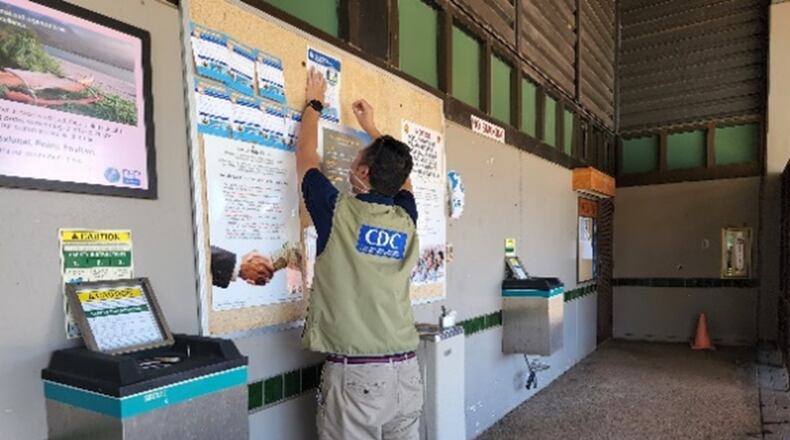The Centers for Disease Control and Prevention will hold its annual Epidemic Intelligence Service (EIS) Conference starting Monday, with public presentations on new public health investigations and research.
The EIS officers — better known as CDC’s disease detectives — will give 97 presentations on a wide range of illnesses from COVID-19 and HIV to polio, gestational diabetes and seasonal flu.
The presentations will include research on COVID hospitalizations among infants being higher than any other age group except adults 65 and over during pandemic periods when the omicron variant was dominant — compared to earlier in the pandemic when the delta strain, considered a particularly aggressive variant, was mostly circulating.
Other research will look at wastewater surveillance being used to identify where poliovirus was circulating in New York, and the link to low vaccination coverage in the studied area. Other research will look at how pregnant women who held multiple jobs were about 50% more likely to develop gestational diabetes and pregnancy-related hypertension, than were pregnant women who held a single job.
Other research looked at the benefits of exercise and showed that even small amounts of aerobic and muscle-strengthening activity lowered patients’ risk of death from influenza and pneumonia, compared to those who had no physical activity. The researchers found that those who met physical activity guidelines nearly cut in half their risk of death from influenza and pneumonia, compared to those who didn’t exercise enough.
The guidelines recommend at least 150 minutes of moderate-intensity physical activity and muscle-strengthening exercises at least two days a week.
Credit: Natrice Miller / Natrice.Miller@ajc.com
Credit: Natrice Miller / Natrice.Miller@ajc.com
Dr. Bryant Webber, a preventive medicine doctor and EIS officer since July 2021 said he remembers data emerging early in the pandemic showing that a lack of exercise was a risk factor for severe COVID. Webber said that prompted him to study the connection between exercise and health outcomes of those with influenza and or pneumonia. The findings are based on analyzing data from the National Health Survey of 577,000 adults from 1998 to 2019.
“Things like cystic fibrosis or being a former smoker, these things are hard to modify,” he said. “But physical inactivity is really something we can work on. We also have really good data from other studies that show physical activity, irrespective of weight and irrespective of changes in weight, has many benefits.”
Credit: cus
Credit: cus
In addition to the presentations, current and former disease detectives will give a behind-the-scenes look at their experiences in TED-style talks which include the following:
- Breakfast Fish, Boat Rides, and Bibis: Behind the Scenes of the Polio Response in Tanzania
- Putting Baby Booties on the Ground: Protecting the Most Vulnerable
- New Learnings from an Old Disease: Mpox and Health Disparities in the United States
- Three Islands, One Health: Capacity Building the United States Virgin Islands
- Perfumes, Pet Raccoons, and Mississippi Melioidosis
- From Intuition to Action: How Gut Feelings Can Drive Public Health Solutions
CDC EIS Conference
Monday-Thursday, Crowne Plaza Atlanta Perimeter at Ravinia Atlanta. Free and open to the public. Conference attendance is free and open to the public, and the presentations will also be live-streamed with recordings available via a virtual platform. Event registration is required for attendance and will remain open throughout the conference. For more information and to register go to https://www.cdc.gov/eis/conference/index.html
About the Author
The Latest
Featured



